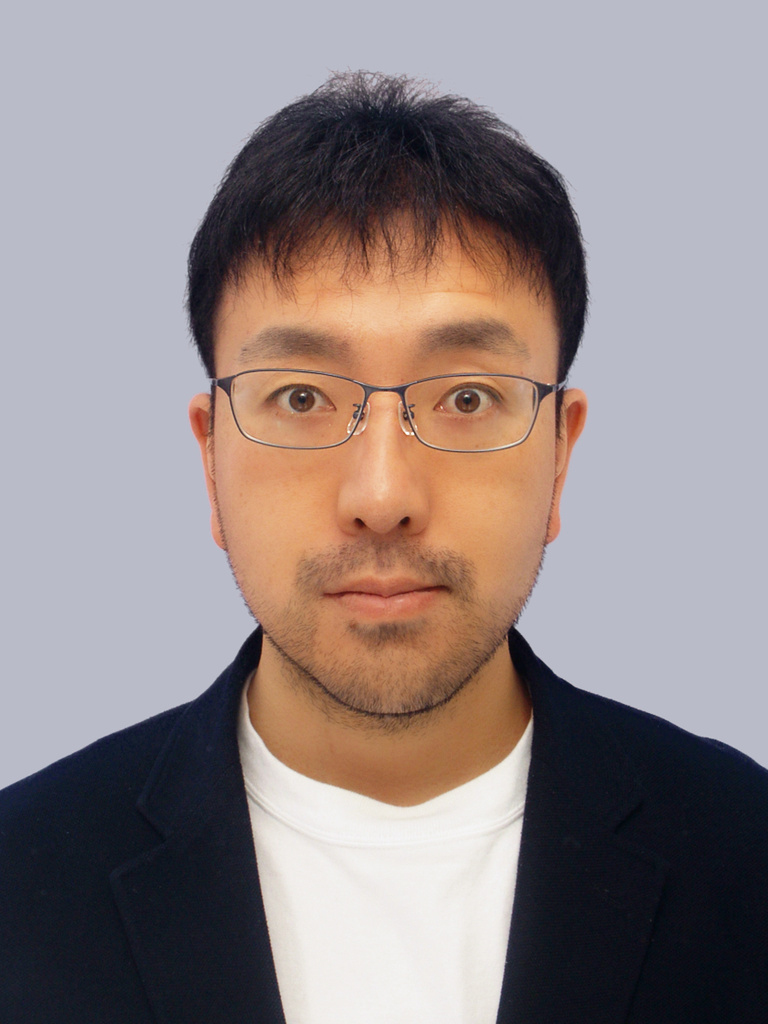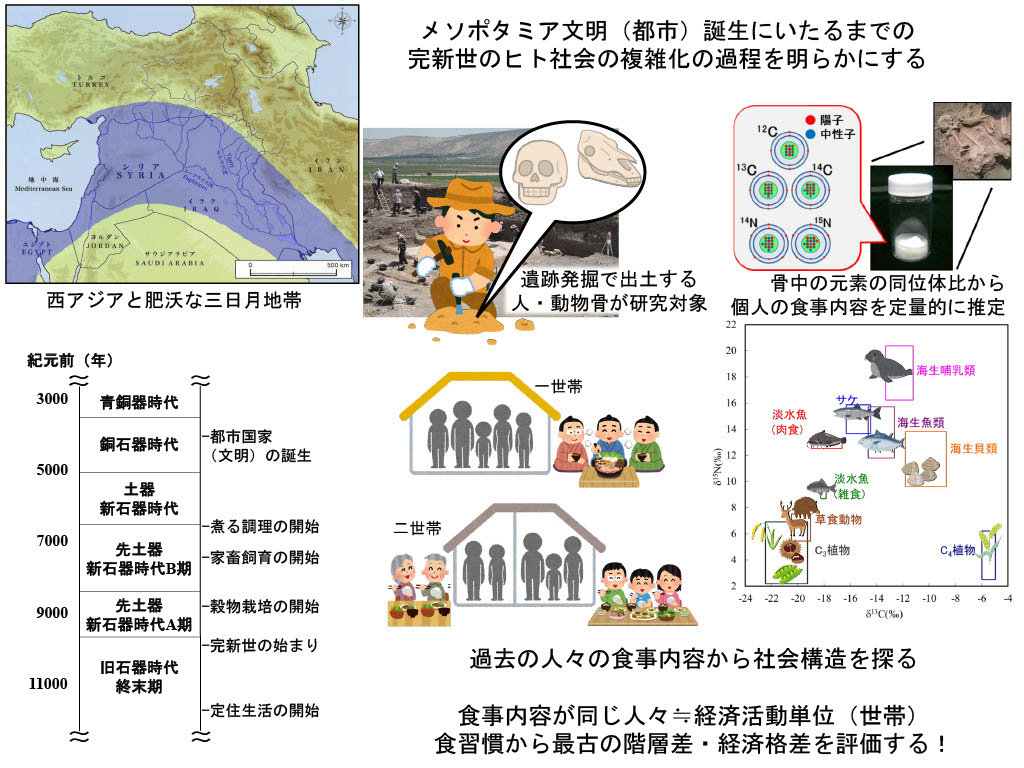第1期フェロー

板橋 悠
ITAHASHI, Yu
筑波大学
人文社会系
准教授
Associate Professor
Institute of Humanities and Social Sciences
University of Tsukuba
- 専門分野
Research fields - 考古学・自然人類学
Archaeology, Physical anthropology
- 研究テーマ
Research project - 遺跡出土骨の同位体分析による先史時代の食習慣復元
Dietary reconstruction by isotopic analyses of archaeological bones
- キーワード
Keywords - 考古学、食性、同位体、人骨、農耕、文明
archaeology, diet, isotope, human bone, agriculture, civilization
- 研究者総覧
Researchers Information - https://trios.tsukuba.ac.jp/researcher/0000004292
- researchmap
- https://researchmap.jp/itahashi
経歴
Biography
筑波大学 人文学類 考古学・民俗学主専攻 卒業、東京大学 新領域創成科学研究科 先端生命科学専攻 修士/博士課程 修了、博士(生命科学)。学部時代は考古学を専攻し、大学院では自然人類学に移り遺跡出土人骨の同位体分析を学ぶ。また博士課程時には日本学術振興会特別研究員(DC1)および海洋研究開発機構の研究生として骨の有機地球化学的分析法の開発を行った。東京大学 総合研究博物館では特任研究員として中国の長江流域における地方文明成立をテーマとした研究を行う。2019年5月より筑波大学に助教として着任、西アジアの都市文明成立前夜を主な対象とする研究を続けている。
He majored in archaeology at University of Tsukuba and then moved to physical anthropology at the University of Tokyo. He developed an organic geochemical analysis for ancient bones during his doctoral course. As a researcher at the University of Tokyo, he focused on establishing the local civilization in the Yangtze region of China. He has been at the University of Tsukuba since May 2019, where he continues his research mainly on the eve of the establishment of civilizations in West Asia.
研究概要
Research Outline

完新世の温暖化(1万2千年前)以降に世界のいくつかの地域で農耕(穀物栽培・家畜飼養)が開始され、農耕による食糧生産を背景に農耕起源地でメソポタミア文明(西アジア)、エジプト文明(エジプト)、中国文明(中国)などの国家・都市を抱える「文明」が出現した。私は農耕と文明の起源地(西アジア、中国)を対象に遺跡出土人骨・動物骨で理化学分析を行い、生前の食生活や出身地・移住履歴等を調べることで当時の社会構造やその変化・発展過程の詳細を明らかにしようとしている。
考古学では遺跡から出土する動植物遺存体や調理器具、貯蔵穴の分析から過去の食習慣の復元が試みられている。しかし、この方法では集落・集団全体の傾向を捉えることはできるが共同体内の個人間の違いを求めることは難しい。私の行う骨の同位体分析は人骨個人・動物骨個体の生前の食性を定量的に推定することが可能であり、共同体内の個人比較から貧富の差や性差、仕事の分業などによる社会の中に存在した「食習慣の違い」を検証することを得意とする。家屋や財産から明確な経済格差を観測することが難しい文明誕生以前の先史社会では食習慣の違いが身分差・階級差の萌芽を捉える鍵となり、文明誕生に至る社会の複雑化の一歩目を明らかする強みとなっている。
During the Holocene, which began 12,000 years ago, agriculture began in several regions of the world, and civilizations with states and cities emerged backed by food production in Mesopotamia, Egypt, China, etc. I am conducting an isotope analysis of archaeological bones in West Asia and China, and I am trying to clarify the social structure and the process of development of the prehistoric societies by examining people's diet or migration history.
In archaeology, attempts have been made to reconstruct past human diets by analyzing animal and plant remains, cooking utensils, and storage excavated from sites. However, while this method can reveal trends of a community as a whole, it is difficult to determine individual differences within a community. Because isotopic analysis of individual bones can quantitatively estimate dietary habits for individual humans and animals, this method can compare individuals and examine dietary differences within a society due to differences in wealth, gender, division of labor, etc. In societies before the establishment of civilization, where evident economic disparities from property and house are difficult to observe, the difference in the diets is the key to detecting the emergence of status and class differences and is advantageous in revealing the first steps in the social complexity that led to the civilization.
私が目指すトランスボーダー研究者とは
What is my goal as a transborder researcher?
日本では考古学は人文系に位置づけられている。しかし、人類史を明らかにする研究は人文学的手法に限らず、私自身も地球科学的分析を主な手法としている。また人類史の探究には個人で活動するだけでなく、多様な背景や専門をもつ研究者を統合しチームとして学際的な研究を行うことが必要だと感じている。自身が文理を問わない多岐の手法・知識を持つ人材になることも肝心だが、それだけでなく学際的な組織を運営できるPI・統括者としての能力をもった研究者を目指す所存である。
In Japan, archaeology is regarded as one of the humanities. However, the methodology for human history is not only to the humanities but also diverse research fields. I also believe that the research for human history should not be conducted by a solo effort but rather by a team of diverse experts to conduct interdisciplinary. My goal is not only to become a researcher with multiple methods and broad knowledge myself, but I also aim to become a transborder researcher with the ability to manage an interdisciplinary organization as a PI.
ピックアップムービー
-
TRiSTARフェロー紹介 第1期フェロー 板橋 悠 ITAHASHI, Yu
関連記事
Related article
- 2023/12/08
- 【開催案内】【コンソーシアム機関限定プログラム】第2回TRiSTAR共創リレーセミナー(2023年12月20日)
